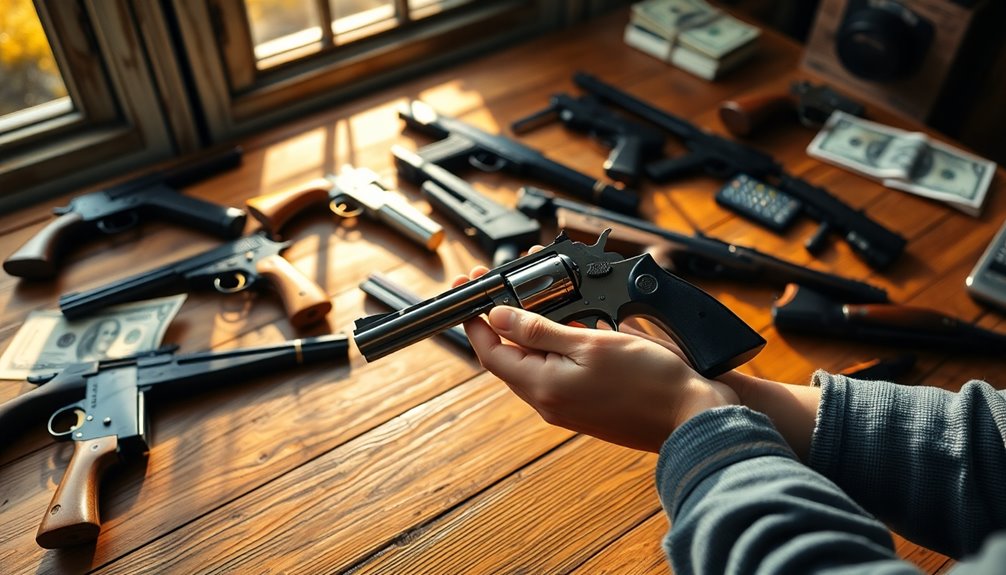Selling a gun legally without breaking the bank is possible with the right steps. First, educate yourself on Texas laws regarding eligibility and documentation. Use online platforms like GunBroker or local classifieds to find buyers without high fees. Set a competitive price by researching market trends and be open to negotiation. Always conduct transactions in safe, public spaces, and create a bill of sale to protect yourself legally. Verify the buyer's eligibility and use secure payment methods. Follow these guidelines, and you'll increase your chances of a successful sale while minimizing costs. There's plenty more to uncover on smart selling strategies.
Understanding Texas Gun Laws
When you're considering selling a gun in Texas, it's vital to understand the state's gun laws to guarantee you're following the rules. Texas law permits individuals aged 18 and older to purchase rifles and shotguns, while handguns are restricted to those 21 and above.
When you sell your gun through private sales, background checks aren't required. However, you must verify that the buyer is legally eligible to own a firearm. Remember, it's illegal to sell firearms to minors, felons (before five years post-release), individuals with active protective orders, or anyone intending unlawful use. Additionally, utilizing apps that provide automated bill payment notifications can help manage any financial transactions related to your sale efficiently. Implementing clear payment terms can further streamline your transaction process.
Compliance with both federal law and Texas law is fundamental during your firearm sale. This means verifying the buyer's eligibility and maintaining records of the transaction. Additionally, consider using bill tracking tools to manage any potential financial implications related to your sale.
To protect yourself legally, it's advisable to create a bill of sale that includes the transaction date and the buyer's information. This document serves as evidence of the sale and can help you avoid potential legal issues in the future. Regularly reviewing your billing processes can also enhance the overall efficiency of your transactions.
Following these guidelines will help guarantee that your sale is both legal and hassle-free.
Selling Platforms for Firearms
When you're ready to sell your firearm, the platform you choose can make a big difference. Online sales platforms like GunBroker.com connect you with a larger audience, while local transaction options allow for immediate cash without shipping hassles. Weighing these options will help you maximize your sale and find the right buyer. Utilizing price comparison tools can also help you determine a competitive selling price for your firearm. Additionally, considering price comparison accuracy can ensure you set a fair price based on real-time market trends. To enhance your pricing strategy, using tools like Google Shopping can provide insights into current market values for similar firearms.
Online Sales Platforms
Online sales platforms like GunBroker.com and Armslist have revolutionized how firearms are bought and sold, providing sellers with a vast audience beyond their local markets.
These online marketplaces make it easy for you to connect with potential buyers nationwide, often with lower fees than traditional gun shops, maximizing your profits.
You can list your firearms using user-friendly interfaces, uploading photos and descriptions to attract buyers quickly. Many sellers appreciate the ability to conduct private transactions, which allows you to sell without the need for background checks, as long as you verify the buyer's eligibility to own firearms.
Platforms like GunBroker also feature auction-style listings, which can generate competitive bids, potentially raising the sale price beyond fixed-price listings. This dynamic can lead to better deals for you as a seller.
While the convenience of online sales is evident, always remember to comply with local laws regarding firearm sales.
Local Transaction Options
Local transaction options provide effective ways to sell firearms while ensuring you meet legal requirements.
Utilizing local classifieds and community bulletin boards can facilitate face-to-face transactions, helping you avoid fees associated with online sales or dealers. Gun shows are another excellent venue, where you can set up a table as a private seller and interact directly with potential buyers, all while adhering to local regulations.
If you prefer convenience, consider trade-ins at your local gun shop. While this option may yield lower returns compared to private sales, it offers a hassle-free experience.
Alternatively, you can use platforms like Armslist, which allows you to reach a broader audience within your community for local sales.
For those who want to minimize effort, consignment services at local gun stores are a great choice. The shop will display your firearms for sale and handle the transaction process, allowing you to focus on other tasks while still getting your firearm sold.
Each of these local transaction options provides unique benefits, helping you sell your gun legally and efficiently.
Legal Requirements for Sales
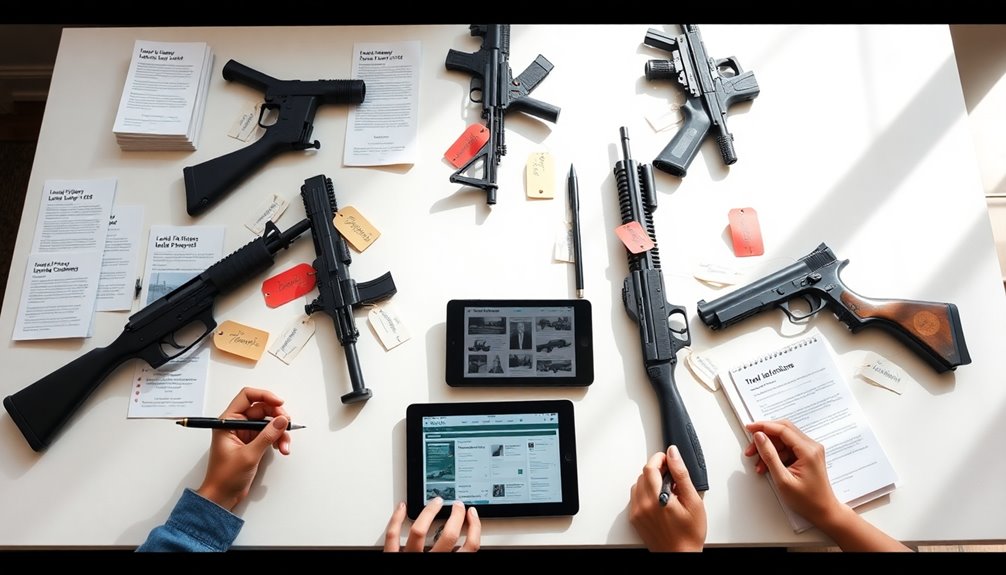
When selling a gun, you need to know the legal age requirements for buyers, which vary for different types of firearms. While Texas doesn't mandate background checks for private sales, it's your responsibility to confirm the buyer's eligibility. Ethical shopping practices can also inform you about responsible firearm ownership and sales practices. Additionally, understanding the importance of budgeting for financial goals can help you manage any financial aspect related to your sale. Finally, even though formal documentation isn't required, keeping records of the transaction can protect you legally. Additionally, engaging in conscious consumerism can enhance your understanding of responsible firearm ownership and sales practices.
Minimum Age Compliance
Guaranteeing minimum age compliance is essential for anyone looking to sell firearms legally. In Texas, the minimum age to purchase rifles and shotguns is 18 years, while for handguns, it's 21 years. Before you sell a firearm, you must verify the buyer's age to guarantee compliance with Texas State Law. This verification process protects you from legal issues and helps maintain the integrity of firearm sales.
Buyers must be of legal age, and it's illegal to sell firearms to individuals under 18 or to intoxicated persons. Additionally, be cautious when selling to individuals with felony convictions, as they may not be eligible to buy a firearm until five years after their release.
As a seller, you bear the responsibility to confirm the buyer's legal eligibility, including their age, before completing any sale.
Take the time to check identification and guarantee that all requirements are met. Failing to adhere to these regulations can lead to serious consequences, so always prioritize minimum age compliance in your transactions.
Background Check Obligations
Steering through the complexities of background check obligations is essential for anyone selling firearms in Texas. While private sellers aren't required to conduct background checks, it's still your responsibility to ascertain the buyer is legally eligible to own a firearm.
Federal law stipulates that buyers must meet certain criteria, such as being of the appropriate age and not being a prohibited person, like a felon or someone under a restraining order.
To protect yourself, verify the buyer's identity and eligibility by requesting a state driver's license or other valid identification. Although background checks aren't mandatory for private sales in Texas, you can opt to conduct one through local FFL dealers for a nominal fee. This step can provide peace of mind and ascertain compliance with legal requirements.
Finally, consider documenting the sale with a bill of sale that includes both buyer information and firearm details. This practice not only protects you against future legal issues but also demonstrates due diligence.
If you're unsure about any legal requirements, seeking legal advice can be invaluable as you navigate the process of selling a gun.
Documentation of Transactions
Documenting transactions is vital for anyone selling a firearm, even if no formal paperwork is legally mandated in Texas. While it might seem unnecessary, creating a bill of sale protects both you as the seller and the buyer. This document should include the transaction date, firearm details, and personal information for both parties.
Be certain to gather the buyer's name, address, contact details, and a copy of their Texas driver's license or License to Carry to verify eligibility.
It's imperative to include the firearm's serial number in all documentation. This not only establishes ownership history but also safeguards you in case the firearm is misused after the sale. A signed bill of sale provides proof of ownership transfer, which can help you avoid legal complications down the line.
Maintaining accurate records of the sale can also protect you from liability if the firearm is misused after the transaction. Although Texas doesn't require formal documentation, keeping thorough records guarantees compliance with legal requirements and offers peace of mind for both you and the buyer.
Always prioritize proper documentation when selling a firearm.
Pricing Your Firearm Competitively
Setting the right price for your firearm is essential to attracting buyers and closing the deal. Start by researching current market prices for similar firearms in your area. Websites like GunBroker.com and Armslist can provide valuable insights into what others are selling for, allowing you to set a competitive price that appeals to potential buyers while ensuring a fair return on your investment. Additionally, using investment tracking tools can help you analyze market trends and make more informed pricing decisions. Regularly evaluating your pricing strategy can lead to better insights into market fluctuations, ultimately enhancing your selling approach.
When pricing your firearm, consider its condition, unique features, and any accessories included. This helps justify your asking price and can make your listing more attractive.
Additionally, factor in any fees associated with different selling methods, like FFL transfer fees or platform listing fees. This way, you can maximize your profit and avoid unpleasant surprises.
Don't hesitate to set your initial price a bit higher than what you're willing to accept. This gives you room to negotiate and still achieve a satisfactory sale outcome.
Being patient during this process can pay off, as it allows you to find the right balance between competitive pricing and a fair return for your firearm. Furthermore, utilizing price comparison tools can help you identify the best selling platforms and ensure you're setting an attractive price based on real-time data.
Safe Transaction Practices
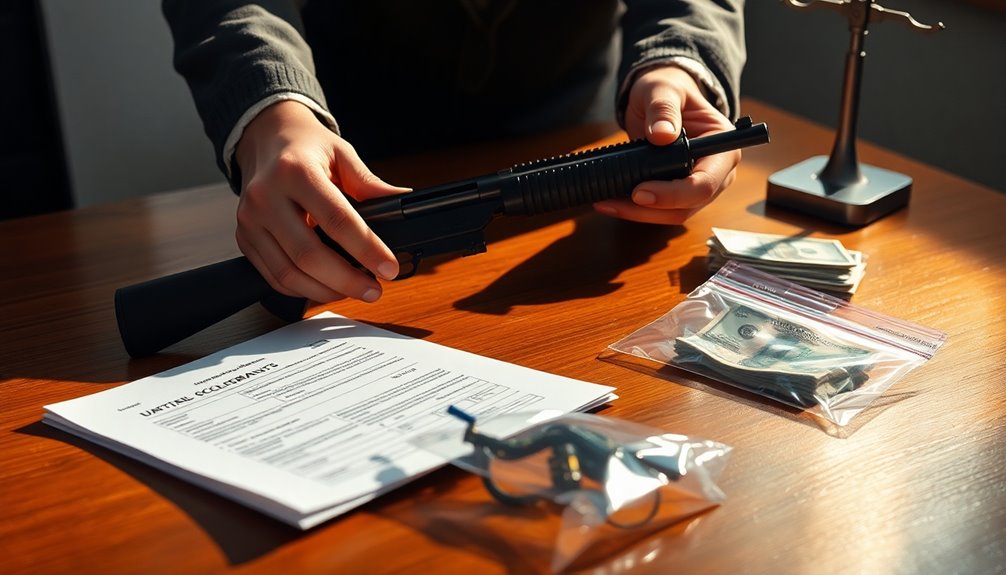
After you've determined a competitive price for your firearm, the next step is to guarantee the sale goes smoothly and safely.
To protect yourself and the buyer, follow these safe transaction practices:
- Conduct the sale in a public location or a designated gun shop to assure safety for both parties involved.
- Verify the buyer's identity and age by requesting a state driver's license or other valid identification before completing the transaction.
- Create a bill of sale that documents the transaction details, including the date, firearm description, and both parties' information to maintain a record of the sale. Additionally, consider implementing expense tracking apps to help manage any associated financial transactions. Using tools like FreshBooks can enhance your financial management during this process.
- Notify local law enforcement if required by law and keep records of the sale to protect yourself from potential legal issues in the future.
- Use cash as the safest payment method, assuring you meet in a secure location to finalize the transaction.
- Consider using expense management apps for enhanced accuracy and organization, as they can help you track any related financial transactions effectively.
Payment Methods and Options
When selling a gun, choosing the right payment method is vital for your safety and security.
Opt for secure options like USPS money orders or certified bank checks, and always be cautious with digital services like Zelle or Venmo.
Secure Payment Options
Choosing secure payment options is essential when selling a gun legally. You want to make certain that the transaction is smooth and protected for both you and the buyer. Reflect on using USPS money orders or certified bank checks, as they provide reliability and an extra layer of security.
While cash is straightforward, always meet in safe environments to minimize risks.
Here are some secure payment options to reflect on:
- USPS money orders for reliable transactions
- Certified bank checks to verify funds are available
- Digital payment services like Zelle and Venmo, but use caution
- A bill of sale documenting the payment method and sale details
- Hold onto funds until the buyer confirms receipt and satisfaction
Each of these options helps create a safe and secure environment for your transaction.
Remember to document everything clearly in the bill of sale, which will serve as your record and may prevent potential disputes later.
Transaction Safety Measures
Ensuring transaction safety involves more than just secure payment options; it's about safeguarding both parties throughout the entire process.
To enhance your transaction safety measures, consider using USPS money orders as a payment method. They provide a reliable alternative without the risks tied to cash. Avoid PayPal for firearm sales due to potential account seizure risks; instead, opt for certified bank checks or cash, taking necessary precautions.
Digital payment services like Zelle and Venmo can be used, but make sure to verify the buyer's identity to mitigate scams.
It's also essential to use a bill of sale to document the transaction. This should include details about the payment method and both parties' information, ensuring you have legal protection.
Whenever possible, conduct background checks on buyers by utilizing local FFL dealers. They can perform these checks for a nominal fee, helping you stay compliant with legal requirements.
Shipping Firearms Legally
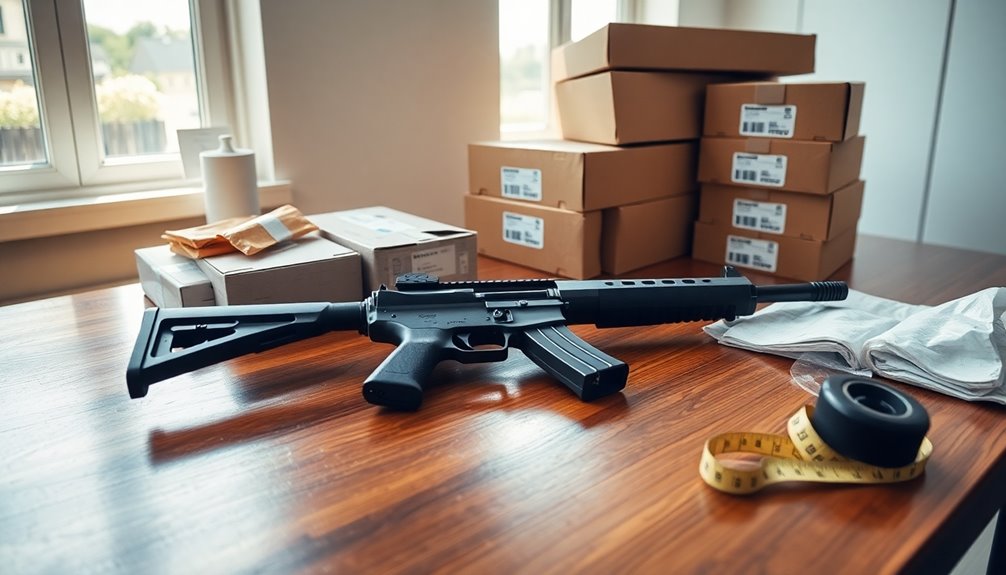
How can you navigate the complexities of shipping firearms legally?
First, remember that shipping firearms legally involves adhering to strict regulations. You'll want to ship through UPS or FedEx, as USPS prohibits non-FFL holders from sending handguns.
Opting for FFL to FFL shipping is your safest bet for ensuring compliance with federal regulations.
Here are key points to keep in mind:
- Always use a sturdy box for proper packaging.
- Secure the firearm within the box to prevent movement during transit.
- Confirm your local FFL's acceptance of the shipment before sending.
- Utilize a reliable shipping label to track your package.
- Be aware that shipping costs may be lower when using an FFL.
Documenting the Sale
Documenting the sale of a firearm is essential for both you and the buyer, as it establishes a clear chain of ownership and protects against potential legal issues.
Start by creating a bill of sale that includes the transaction date, the firearm's serial number, and personal information for both you and the buyer. This documentation is integral for ensuring transparency.
Make sure to ask for a copy of the buyer's Texas driver's license or license to carry. This verifies their identity and eligibility to own a firearm, which is important for your protection.
Be diligent in documenting the firearm's serial number in all paperwork to establish a clear ownership history.
It's wise to retain copies of all sales documents for your personal records. This can shield you from liability if the firearm is misused after the sale.
Additionally, consider having a witness present during the transaction. This adds an extra layer of validation and can provide additional documentation if needed.
Common Selling Mistakes
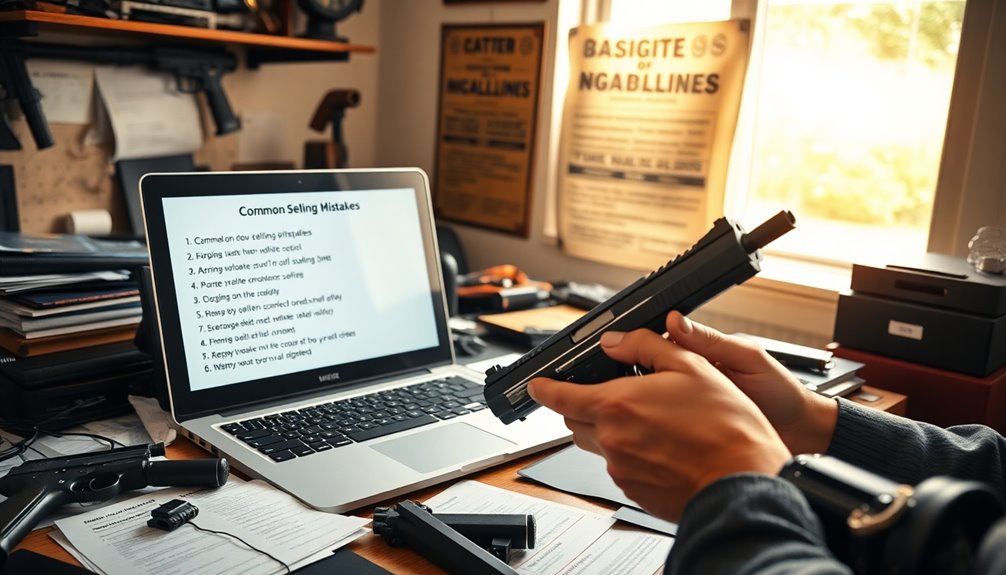
Often, sellers make critical mistakes that can lead to legal trouble or financial loss when selling a gun. It's crucial to navigate the complexities of firearm sales carefully.
Here are some common pitfalls to avoid:
- Failing to verify the buyer's eligibility: Always check if the buyer can legally purchase a firearm. Selling to prohibited individuals can have serious legal consequences.
- Neglecting proper documentation: Without a bill of sale, you risk liability if the firearm is misused after the sale. Documentation proves the transfer of ownership.
- Incorrect pricing: Overpricing or underpricing your firearm without researching market values can deter buyers or lead to financial loss.
- Unsafe selling environments: Conduct your sale in a safe, public location or a licensed gun shop to avoid scams or dangerous situations.
- Ignoring state laws: Be aware of state and federal regulations governing firearm sales. Missing background checks in private sales can lead to unintentional legal violations.
Tips for a Successful Sale
Maximizing your chances of a successful gun sale starts with thorough preparation and research.
Begin by researching current market prices for similar firearms to set a competitive asking price. This helps attract serious buyers while guaranteeing you don't undervalue your firearm.
Leverage online platforms like GunBroker or Armslist to reach a wider audience and minimize selling costs compared to local dealers.
When potential buyers express interest, communicate clearly and provide honest descriptions alongside high-quality photos. This builds trust and paves the way for a smoother transaction.
It's essential to comply with legal requirements by verifying the buyer's eligibility. Confirm they meet age requirements and conduct background checks if necessary to avoid future liabilities.
Once you finalize the sale, document the transaction with a bill of sale. This should include all relevant details, such as the firearm's serial number and both parties' information, for your legal protection.
Conclusion
In the dance of selling your gun, remember to stay in step with the law and keep your feet light on your budget. By choosing the right platform and pricing wisely, you'll attract buyers like bees to honey. Don't forget to document your sale, ensuring a smooth transaction that leaves both parties smiling. With these tips in hand, you're not just selling a firearm; you're crafting a seamless experience that'll echo in your wallet long after the deal is done.

